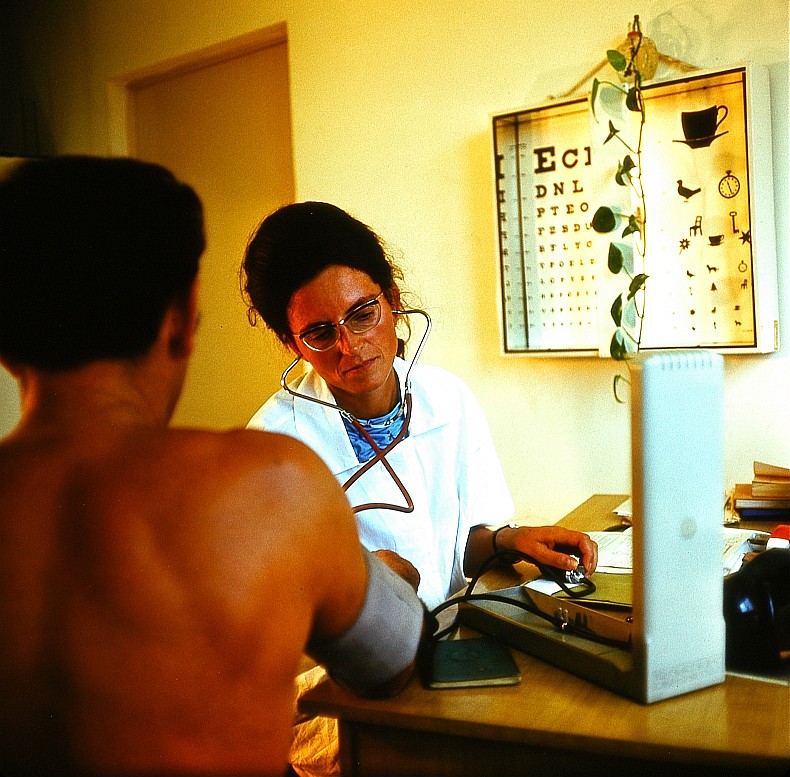 |
| Your PCT will see you now..... |
The Disease Management Care Blog first became aware of the term years ago when it was pointed out that primary care docs can take on some specialty care responsibilities, while nurses can take on primary care roles, while office assistants can take on nursing roles. A parallel phenomenon is the movement of surgeries and other medical procedures from the inpatient to the outpatient surgi-center to the physician's office.
Naturally, the ultimate down-jobbing target is the patient. Examples include the reasonable innovation of self-service kiosks as well as emergency or wacky "self surgery."
Which naturally prompts the DMCB to offer it's own definition of down-jobbing: the historical movement of medical treatment from higher to lower levels or locations of health care services.
Of course, the major driver of down-jobbing is economics. DMCB readers are well aware of our national obsession with transitioning from "fee-for-service" (FFS) to more "value-based" reimbursement arrangements. These include pay-for-performance as well as shared-risk, global or other capitated approaches.
Since traditional FFS is notoriously linked to medical necessity as well as provider credentialing (examples are not hard to find), physicians have had little incentive to go along with down-jobbing. As FFS allegedly goes the way of the dinosaurs (a perspective likewise not hard to find), health care providers in these new value-based payment systems are looking for cost-effective ways to service their patients within a fixed budget or fixed payment system. One way to do that is to down-job.
So it was only a matter of time until someone thought of the option of "primary care technicians" ("PCTs") as a value-based and down-jobbed solution to the nation's physician shortage. As Kellermann et al point out in the November 2013 issue of Health Affairs, the pipeline for primary care docs, physician assistants, nurse practitioners is not only expensive, it's unlikely to meet future demand. They argue that PCTs can be to primary care providers like emergency medical technicians (EMTs) are to emergency care rooms. Like EMTs, PCT training to handle preventive care, treatment of minor illnesses and monitoring chronic conditions needn't be extensive. That's especially true if PCTs are armed with a health IT safety net that provides tablet-based decision-support algorithms that are ultimately tethered to (or teamed with?) a primary care physician.
So there you go: a few questions, a cursory exam and a recommended treatment plan for millions of healthcare hungry Americans is well within reach. All it takes is some additional down-jobbing.
The DMCB thinks that, on paper, it's not a bad idea and no accident that it would appear in the academic health policy literature. Whether this could gain any traction in the real world of patients remains to be seen. Perhaps the next step is a randomized controlled clinical trial comparing the outcomes of patients seeing newly minted PCTs to those receiving usual care.
The DMCB has two additional concerns:
1. The promise of the expansion of access to health insurance under the current iteration of health reform was that patients would be able to access the current health care system, including doctors and hospitals. Even if this system of primary care meet outcome expectations, this will hardly burnish American's ambivalent views of Obamacare.
2. Liability concerns are significant. Allegations of malpractice are inevitable with PCTs and their supervising docs will naturally worry about being ensnared in even more lawsuits by a very nimble plaintiffs' bar.
Image from Wikipedia












1 comment:
Ideally down-jobbing is matched by a simultaneous wave of "up-teaming" ... where there is a physician in a leadership role overseeing the function of the entire system. Something like what happens in a well deployed Patient Centered Medical Home ... yes?
Dike
Dike Drummond MD
TheHappyMD (dot) com
Post a Comment